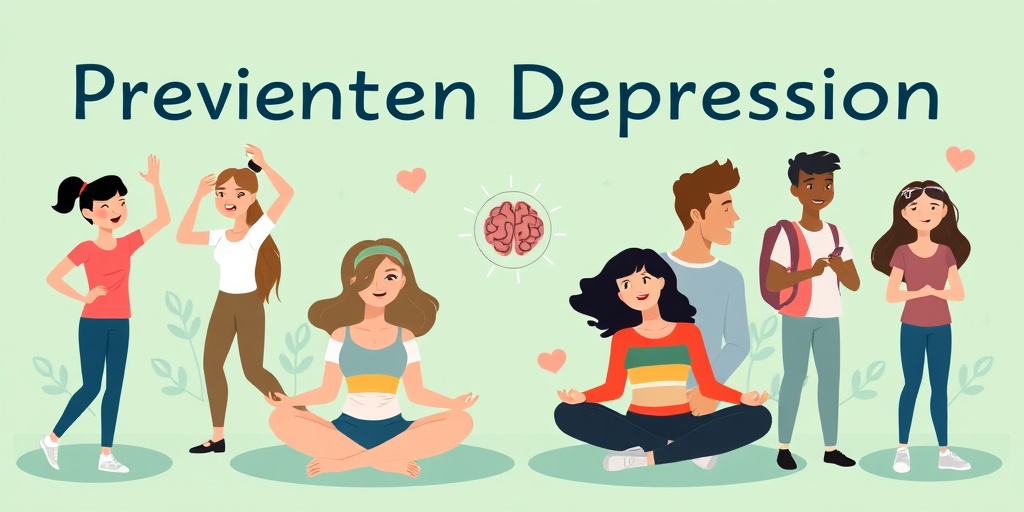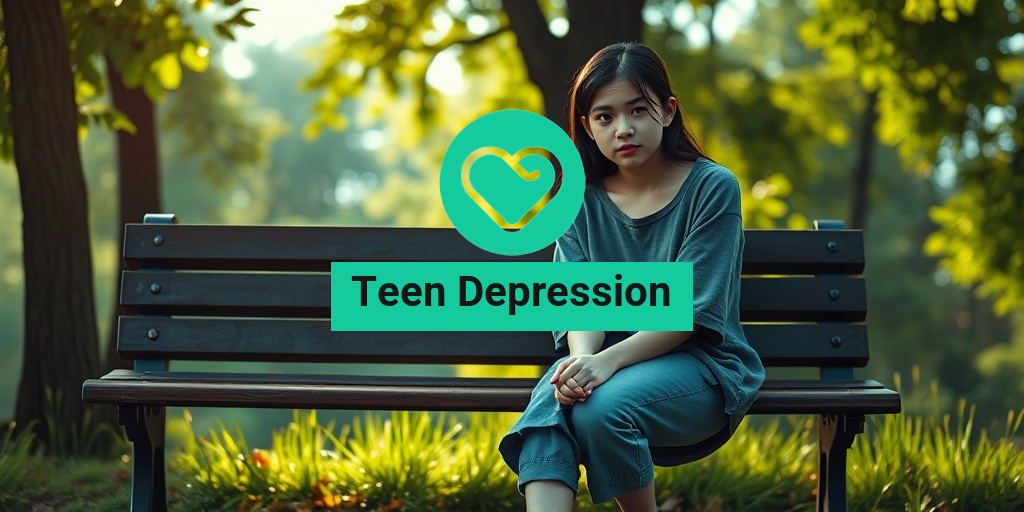What Is Teen Depression?
Teen depression is a serious mental health condition that affects adolescents, typically between the ages of 13 and 19. It goes beyond the occasional feelings of sadness or mood swings that many teenagers experience. Instead, it manifests as a persistent feeling of hopelessness, worthlessness, and a lack of interest in activities that once brought joy. Understanding teen depression is crucial for parents, educators, and peers, as early recognition and intervention can significantly improve outcomes.
According to recent statistics, approximately 3 million adolescents in the United States experience a major depressive episode each year. This alarming figure highlights the importance of awareness and education surrounding this issue. Factors contributing to teen depression can include:
- Genetics: A family history of depression can increase the likelihood of a teen developing the condition.
- Environmental Factors: Stressful life events, such as parental divorce, bullying, or academic pressure, can trigger depressive episodes.
- Biological Changes: Hormonal changes during puberty can also play a role in mood regulation.
Recognizing the signs and symptoms of teen depression is essential for timely intervention. If you suspect a teenager in your life may be struggling, it’s important to approach the situation with empathy and understanding.
Signs of Teen Depression
Identifying the signs of teen depression can be challenging, as many symptoms may be mistaken for typical teenage behavior. However, being aware of the following indicators can help in recognizing when a teen may need support:
Emotional Symptoms
- Persistent Sadness: A teen may exhibit a prolonged sense of sadness or emptiness.
- Irritability: Increased irritability or anger can be a sign of underlying depression.
- Feelings of Worthlessness: Teens may express feelings of inadequacy or self-loathing.
Behavioral Changes
- Withdrawal: A noticeable withdrawal from friends, family, and previously enjoyed activities can indicate depression.
- Changes in Sleep Patterns: Insomnia or excessive sleeping can be a sign of emotional distress.
- Decline in Academic Performance: A drop in grades or loss of interest in school can signal a problem.
Physical Symptoms
- Fatigue: Chronic tiredness or lack of energy is common among depressed teens.
- Changes in Appetite: Significant weight loss or gain can occur due to changes in eating habits.
- Physical Complaints: Unexplained aches and pains may also be reported.
If you notice several of these symptoms persisting for more than two weeks, it may be time to consider a teen depression test or seek professional help. Resources like the teen depression hotline can provide immediate support and guidance.
Addressing teen depression is vital, as untreated depression can lead to severe consequences, including substance abuse, self-harm, or even suicidal thoughts. If you or someone you know is struggling, don’t hesitate to reach out for help. Organizations like Yesil Health AI offer evidence-based health answers and can guide you toward appropriate resources.
In conclusion, understanding teen depression is the first step in combating this pervasive issue. By recognizing the signs and symptoms, we can create a supportive environment that encourages open dialogue and promotes mental well-being among our youth. Remember, it’s okay to ask for help, and there are many resources available to support teens in need. 🌟

Causes of Teen Depression
Understanding the causes of teen depression is crucial for parents, educators, and teens themselves. This mental health condition can stem from a variety of factors, often intertwining to create a complex web of emotional distress. Here are some of the primary causes:
Biological Factors
Genetics can play a significant role in teen depression. If there is a family history of depression or other mental health disorders, a teen may be more susceptible to experiencing similar issues. Additionally, hormonal changes during adolescence can contribute to mood swings and emotional instability, making teens more vulnerable to depression.
Environmental Influences
The environment in which a teen grows up can greatly impact their mental health. Factors such as:
- Family dynamics: A dysfunctional family environment, characterized by conflict, neglect, or abuse, can lead to feelings of hopelessness.
- Peer relationships: Bullying, social isolation, or difficulties in friendships can exacerbate feelings of loneliness and despair.
- Academic pressure: The stress of maintaining grades and meeting expectations can overwhelm teens, leading to anxiety and depression.
Psychological Factors
Teens may also struggle with psychological issues that contribute to depression. Conditions such as anxiety disorders, low self-esteem, or a history of trauma can increase the risk of developing depression. Furthermore, negative thought patterns and a tendency to ruminate on problems can perpetuate feelings of sadness.
Life Events and Changes
Significant life changes, such as moving to a new school, parental divorce, or the death of a loved one, can trigger depressive episodes in teens. These events can create feelings of instability and uncertainty, leading to emotional distress.
Risks and Factors
Identifying the risks and factors associated with teen depression is essential for prevention and early intervention. Here are some key elements to consider:
Demographic Factors
Research indicates that certain demographics may be at a higher risk for depression. For instance:
- Gender: Studies show that adolescent girls are more likely to experience depression than boys, often due to societal pressures and expectations.
- Age: Depression rates tend to increase during the teenage years, particularly in late adolescence.
Pre-existing Mental Health Conditions
Teens with a history of mental health issues, such as anxiety or attention-deficit/hyperactivity disorder (ADHD), are at a greater risk for developing depression. Early intervention and treatment for these conditions can help mitigate the risk.
Substance Abuse
Substance abuse is both a risk factor and a consequence of teen depression. Teens who engage in drug or alcohol use may be attempting to cope with their feelings, but this can lead to a cycle of worsening mental health. It’s crucial to address substance use as part of a comprehensive treatment plan.
Social Media and Technology
In today’s digital age, social media can significantly impact a teen’s mental health. Constant exposure to curated images and lifestyles can lead to feelings of inadequacy and low self-worth. Cyberbullying is another serious concern, as it can exacerbate feelings of isolation and depression.
Access to Support Systems
Having a strong support system is vital for teens struggling with depression. Those who lack supportive relationships with family, friends, or mentors may find it more challenging to cope with their feelings. Encouraging open communication and fostering connections can help mitigate this risk.
Recognizing the causes and risks of teen depression is the first step toward creating a supportive environment for affected individuals. By understanding these factors, we can work together to promote mental health awareness and provide the necessary resources for teens in need. 🌟

Diagnosing Teen Depression
Diagnosing teen depression can be a complex process, as it often involves distinguishing between typical adolescent mood swings and more serious mental health issues. Understanding the signs and symptoms is crucial for parents, educators, and teens themselves.
Recognizing the Symptoms
Teen depression symptoms can manifest in various ways. Here are some common indicators to look out for:
- Persistent Sadness: A teen may seem down or hopeless for an extended period.
- Loss of Interest: Activities that once brought joy may no longer excite them.
- Changes in Sleep Patterns: Insomnia or excessive sleeping can be a red flag.
- Appetite Changes: Significant weight loss or gain can indicate emotional distress.
- Difficulty Concentrating: Struggling to focus on schoolwork or daily tasks is common.
- Social Withdrawal: A teen may isolate themselves from friends and family.
- Feelings of Worthlessness: Negative self-talk and feelings of inadequacy are prevalent.
Utilizing Screening Tools
To aid in the diagnosis, healthcare professionals often use standardized tools such as the teen depression scale. These assessments can help gauge the severity of symptoms and determine the best course of action. Parents and guardians can also encourage their teens to take a teen depression test online, which can provide insights into their mental health.
Consulting a Professional
If you suspect that a teen is struggling with depression, it’s essential to consult a mental health professional. They can conduct a thorough evaluation, which may include:
- A detailed interview about the teen’s mood, behavior, and family history.
- Standardized questionnaires to assess the severity of symptoms.
- Collaboration with school counselors or other professionals involved in the teen’s life.
Early diagnosis is key to effective treatment, so don’t hesitate to seek help if you notice concerning signs. 📞
Teen Depression Treatment Options
Once diagnosed, there are several effective treatment options available for teen depression. The right approach often depends on the severity of the depression and the individual needs of the teen.
Therapeutic Approaches
Therapy is a cornerstone of treatment for teen depression. Here are some common therapeutic options:
- Cognitive Behavioral Therapy (CBT): This type of therapy helps teens identify and change negative thought patterns and behaviors.
- Interpersonal Therapy (IPT): Focuses on improving relationships and social functioning, which can alleviate depressive symptoms.
- Family Therapy: Involves family members in the treatment process to improve communication and support.
Medication Options
In some cases, medication may be necessary to manage symptoms. Teen depression medication typically includes:
- Antidepressants: Selective serotonin reuptake inhibitors (SSRIs) are commonly prescribed and can help balance mood.
- Anti-anxiety Medications: These may be used if anxiety is a significant component of the teen’s depression.
It’s crucial to work closely with a healthcare provider to monitor the effectiveness of any medication and adjust dosages as needed. 💊
Support Systems
Building a strong support system is vital for recovery. Encourage teens to engage in:
- Peer Support Groups: Connecting with others who understand their struggles can be incredibly beneficial.
- Extracurricular Activities: Participation in sports, arts, or clubs can boost self-esteem and provide a sense of belonging.
- Open Communication: Maintaining an open dialogue with trusted adults can help teens feel supported and understood.
In conclusion, recognizing and treating teen depression is essential for the well-being of adolescents. With the right support and treatment, recovery is possible, allowing teens to thrive and lead fulfilling lives. 🌈

Supporting a Depressed Teen
Supporting a teen who is experiencing depression can be challenging, yet it is crucial for their recovery. Understanding the signs and symptoms of teen depression is the first step in providing effective support.
Recognizing the Signs of Teen Depression
Many parents and guardians may not recognize the signs of teen depression until it becomes severe. Here are some common symptoms to look out for:
- Persistent sadness: A teen may seem down or hopeless for an extended period.
- Loss of interest: Activities that once brought joy may no longer excite them.
- Changes in appetite: Noticeable weight loss or gain can be a red flag.
- Sleep disturbances: Insomnia or excessive sleeping can indicate underlying issues.
- Withdrawal: A teen may isolate themselves from friends and family.
- Difficulty concentrating: Struggles with schoolwork or decision-making can be a sign.
Creating a Supportive Environment
Once you recognize the signs, creating a supportive environment is essential. Here are some strategies:
- Open communication: Encourage your teen to express their feelings without judgment. Let them know you are there to listen.
- Be patient: Recovery takes time. Show understanding and avoid pushing them to “snap out of it.”
- Encourage professional help: Suggest seeking help from a mental health professional. A teen depression test can be a good starting point.
- Promote healthy habits: Encourage regular exercise, a balanced diet, and sufficient sleep, as these can significantly impact mood.
Utilizing Resources
There are numerous resources available for both teens and their families. Consider the following:
- Hotlines: The teen depression hotline can provide immediate support and guidance.
- Support groups: Connecting with others who understand can be incredibly beneficial.
- Educational materials: Reading teen depression articles can help you understand the condition better.
Preventing Teen Depression
While it may not be possible to prevent all cases of teen depression, there are proactive steps that can significantly reduce the risk.
Fostering Resilience
Building resilience in teens is key to preventing depression. Here are some effective strategies:
- Encourage problem-solving: Teach your teen how to approach challenges and find solutions.
- Promote social connections: Help them build strong friendships and support networks.
- Teach coping skills: Equip them with tools to manage stress and emotions effectively.
Creating a Positive Home Environment
A nurturing home environment can significantly impact a teen’s mental health. Consider these tips:
- Model healthy behaviors: Show your teen how to manage stress and emotions in a healthy way.
- Encourage open dialogue: Make it clear that discussing feelings is important and welcomed.
- Limit exposure to negativity: Be mindful of the media and social influences your teen is exposed to.
Engaging in Community Activities
Encouraging your teen to participate in community activities can also help prevent depression:
- Volunteer work: Helping others can boost self-esteem and provide a sense of purpose.
- Extracurricular activities: Encourage involvement in sports, arts, or clubs that interest them.
- Family activities: Spend quality time together to strengthen bonds and create lasting memories.
By taking these steps, you can help support your teen and potentially prevent the onset of teen depression. Remember, early intervention is key! 🌟

Frequently Asked Questions about Teen Depression
What are the common symptoms of teen depression?
Teen depression can manifest in various ways. Some of the common symptoms include:
- Persistent sadness or low mood
- Loss of interest in activities once enjoyed
- Changes in appetite or weight
- Sleep disturbances, such as insomnia or oversleeping
- Difficulty concentrating or making decisions
- Feelings of worthlessness or excessive guilt
- Thoughts of death or suicide
How can I take a teen depression test?
If you suspect that you or someone you know may be experiencing teen depression, taking a depression test can be a helpful first step. Many online resources offer self-assessment tools that can provide insight into your mental health. However, it’s important to consult a mental health professional for a comprehensive evaluation.
What are the treatment options for teen depression?
Treatment for teen depression often includes a combination of:
- Therapy: Cognitive-behavioral therapy (CBT) and other therapeutic approaches can be effective.
- Medication: Antidepressants may be prescribed by a healthcare provider if necessary.
- Support groups: Connecting with peers who understand can provide comfort and encouragement.
- Lifestyle changes: Regular exercise, a balanced diet, and sufficient sleep can also help improve mood.
What are the statistics on teen depression?
Understanding the statistics surrounding teen depression can highlight the importance of addressing this issue. Recent studies indicate that:
- Approximately 1 in 5 teens experience depression before reaching adulthood.
- Only about 30% of teens with depression receive treatment.
- Rates of depression among teens have been increasing over the past decade.
Where can I find a teen depression hotline?
If you or someone you know is in crisis, it’s crucial to reach out for help. Many organizations offer hotlines specifically for teens dealing with depression. You can find support through:
- The National Suicide Prevention Lifeline: 1-800-273-TALK (8255)
- Crisis Text Line: Text “HELLO” to 741741
- Your local mental health services or school counselor
Are there any movies that address teen depression?
Several films tackle the subject of teen depression and can provide insight into the struggles faced by adolescents. Some notable titles include:
- The Perks of Being a Wallflower
- Girl, Interrupted
- Dead Poets Society
What is the teen depression scale?
The teen depression scale is a tool used by mental health professionals to assess the severity of depression in adolescents. It typically includes a series of questions regarding mood, behavior, and daily functioning. This scale helps in determining the appropriate treatment plan.
What medications are commonly prescribed for teen depression?
When medication is deemed necessary, healthcare providers may prescribe:
- Selective serotonin reuptake inhibitors (SSRIs): Such as fluoxetine (Prozac) or sertraline (Zoloft).
- Serotonin-norepinephrine reuptake inhibitors (SNRIs): Such as venlafaxine (Effexor).
Always consult with a healthcare professional before starting any medication.
How can I support a friend with teen depression?
If you have a friend who is struggling with teen depression, here are some ways you can offer support:
- Listen without judgment and let them express their feelings.
- Encourage them to seek professional help.
- Be there for them and check in regularly.
- Engage in activities together that they enjoy.
Remember, it’s important to take any signs of depression seriously and to seek help when needed. 💙




